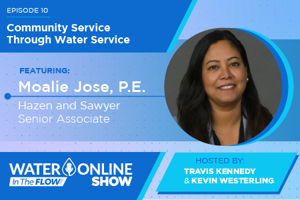LEAD AND COPPER RULE (LCR) RESOURCES
-
Elevated Lead Levels Could Flow From Some US Drinking Water Kiosks2/11/2026
After high-profile water crises like the one in Flint, Michigan, some Americans distrust the safety of tap water, choosing to purchase drinking water from freestanding water vending machines or kiosks.
-
Challenge Winners Offer Improved Water Access, Lead Pipe Identification1/6/2026
The winners of The Water Council’s fall Tech Challenge are helping improve water quality for all, from Wisconsin to Nigeria. Geotek Water Solutions of Jos, Nigeria, is the first African company to win the Tech Challenge, securing the $10,000 first prize. Service ID of Fitchburg, Wisconsin, was named runner-up, winning $5,000.
-
The Final Mile: The U.S. Simply Must Rush To Finish Its Critical Lead-Pipe Cleanup12/5/2025There has been an abundance of funding available to address the estimated 9.2 million lead service lines currently deliver drinking water to homes, businesses, schools, and unsuspecting citizens throughout the United States. So it is disheartening to realize that millions of lead water lines are still delivering water to citizens.
-
EPA Announces $3B In New Funding For States To Reduce Lead In Drinking Water11/25/2025
Today, U.S. Environmental Protection Agency (EPA) announced $3B in new funding for states through the State Revolving Fund (SRF) programs to reduce exposure to lead in drinking water.
-
Taking The Lead On Ditching Lead11/5/2025
AWWA C800, Underground Service Line Valves and Fittings, was built around the use of one brass alloy, C83600, also known as leaded red brass, favored for its manufacturability and low cost. Over the last two decades, the waterworks industry has transitioned to brass alloys that meet the definition of lead-free for most surfaces contacting potable water.
-
NJDEP, Robert Wood Johnson Foundation And Arcadis Commence Lead Poisoning Prevention Week By Launching Collaboration To Accelerate Lead Pipe Replacements10/21/2025
In recognition of International Lead Poisoning Prevention Week, the New Jersey Department of Environmental Protection (NJDEP) today announced a new collaboration with the Robert Wood Johnson Foundation (RWJF) and Arcadis, a global engineering services firm, to accelerate the replacement of lead service lines in New Jersey communities.
-
Acting Governor Way Signs Legislation Enhancing Lead Disclosure And Testing Requirements9/19/2025
Acting Governor Tahesha Way today signed into law A2929/S1034, which requires landlords to report information about the known or potential presence of lead in drinking water to tenants of residential units, requires public water systems to conduct a lead water test at the request of an occupant at no charge, and deters landlords from obstructing the replacement of lead pipes.
-
EPA Announces $3M In Funding To Reduce Lead In Tribal Drinking Water9/16/2025
Today, U.S. Environmental Protection Agency (EPA) announced grant funding totaling more than $3M for three projects to reduce lead in drinking water in Tribal communities.
-
Missouri-Based Public Water Supply District No 2 Of St. Charles County Selects Electro Scan For Water Inventory Services8/19/2025
Public Water Supply District No. 2 of St. Charles County, Missouri, in partnership with St. Louis‑based Cole & Associates consulting engineers, has launched a new lead detection initiative to meet U.S. EPA Lead and Copper Rule Improvements (LCRI) requirements, in coordination with the Missouri Department of Natural Resources (DNR).
-
House Legislators Introduce The Safe Drinking Water for Disadvantaged Communities Act8/19/2025
Bipartisan legislation introduced by Representatives Zachary Nunn (R-Iowa) and Emilia Sykes (D-Ohio) would require that 100 percent of the $15 billion in funds allocated under the Infrastructure Investment and Jobs Act for lead service line replacement is distributed to disadvantaged communities in the form of forgivable loans or grants.
LCR SOLUTIONS
-
Mueller Offers Expansive Portfolio Of BABA Compliant Products5/19/2024
Whenever possible, Mueller tailors product certification to match specific job requirements, including part numbers, job identification, and funding agency requirements. We have developed this process working closely with the Environmental Protection Agency (EPA) who was very early in clarifying definitions and requirements for Iron & Steel Products, Construction Materials, and other Manufactured Products.
-
PWS Pro3/18/2024
120Water’s PWS Pro offers an all-encompassing water quality management program. This integrated system combines all your key water quality initiatives, empowering you to take action across all areas. From necessary communications and notifications to replacement and sampling programs, as well as ongoing service line verification, PWS Pro serves as your comprehensive system of record.
-
PWS Portal3/18/2024
120Water’s PWS Portal allows utilities to build the data foundation to power efficient water quality program management.
-
Kickstart Your Inventory Development With Free LCRR Planning Session10/20/2023
Feeling overwhelmed with the new revisions and need guidance on where to start?
ABOUT LEAD AND COPPER
The U.S. EPA’s Lead and Copper Rule (LCR), a mandate for drinking water utilities and pipeline products manufacturers to reduce the public’s exposure to lead, received increased scrutiny following the 2014 lead crisis in Flint, MI, leading to new Lead and Copper Rule Revisions (LCRR) which take effect in 2020. Although the LCR has been updated numerous times, the most recent requirements demand a level of action unprecedented since the LCR's initial implementation in 1991. Under the LCRR, utilities must have programs in place for tap-sampling, corrosion control treatment (CCT), lead service line replacement (LSLR), consumer communication, and public education. LCRR will affect almost all aspects of utility operations (treatment, distribution, labor, financial planning, consumer outreach, etc.) to varying and often complex degrees. This information hub will provide LCRR guidance, news, and analysis to facilitate compliance, answering questions such as: What is the maximum contaminant level (MCL) for lead and copper? Who is responsible for the lead service line (LSL)? Which chemicals provide corrosion control? When do Lead and Copper Rule Revisions take effect?
If you have a question not answered here, send an email to editor@wateronline.com.

